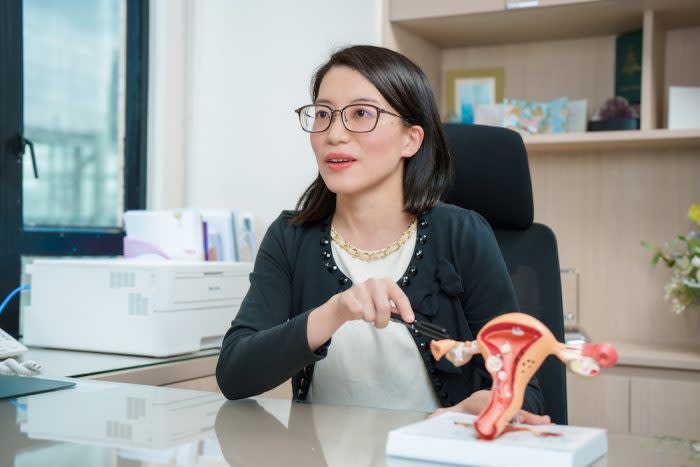Menstrual pain is a monthly torture for urban women, but long-term menstrual pain is unusual. Rachel, a patient with chocolate tumor (endometriosis), suffered from long-term menstrual pain. After the diagnosis, she needed immediate surgery and then took long-term oral hormone drugs to control her condition. Later, she stopped taking the medicine because she was trying to conceive, but she relapsed again. During the period, she faced great physical and mental pressure, and felt that “not taking medicine is even more terrifying.” Dr. Zhang Kaiqing, a specialist in obstetrics and gynecology, pointed out that if the chocolate tumor is not larger than 4-5 cm, and There is no sign of bursting, and the patient can take oral hormone drugs for a long time until menopause, and the condition can be controlled or surgery can be avoided. If the lesion is large or has affected other organs, surgery is required as soon as possible. However, this is not a permanent solution. If the patient does not take medicine after the operation, there is a great chance that the recurrent chocolate tumor will be resected. Severe cases are more likely to be removed. Uterus.

Many women mistakenly think that menstrual pain is an inevitable phenomenon, but in fact, there is a chance that they may suffer from endometriosis. Rachel, a 36-year-old endometriosis patient, suffered from long-term menstrual pain before she was diagnosed. She always thought that taking ordinary painkillers would relieve her pain. Until dizziness and vomiting after a meal, he was admitted to the hospital and was diagnosed with endometriosis. He needed immediate surgery to remove a tumor with a diameter of 11 cm. After the operation, he has been taking oral hormone drugs for seven years to control the condition, which effectively relieved the previous menstrual pain problem. Rachel, who usually resists taking drugs, said, “If the birth pain is grade ten, menstrual pain is also grade seven.” Moreover, she once relapsed after stopping the drug, and the pain intensified as a result. “In contrast, not taking medicine is scary, so you must take medicine, at least you can have a normal life.” Rachel said that if she knew about chocolate tumor earlier, she would definitely seek medical treatment and receive drug treatment. She advised long-term menstrual pain Ladies, you should consult a specialist as soon as possible to prescribe the right medicine to get rid of menstrual pain.

As there is currently no complete cure for endometriosis, even surgical resection is not a cure-all. Dr. Zhang pointed out that many women were diagnosed with ultrasound examinations at the clinic. Like Rachel, they immediately underwent surgery to remove the chocolate tumor. “Even after surgical resection, patients still need to continue to take medicine to control the disease, because estrogen in women can stimulate the growth of chocolate tumors, and oral hormone drugs such as progesterone can reduce estrogen levels and reduce the growth of endometriotic tissue. “Dr. Zhang pointed out that a patient was diagnosed and underwent surgery at the age of 24, but because he did not continue to take medication after the operation, he needed to “take an extra knife” a few years later. It can be seen that without drugs to control the disease, the chance of recurrence of chocolate tumor is very high. High, and the process will continue to cycle.

Endometriosis will affect the fertility of patients, so patients need to race against time to grasp the golden period of two years after stopping the drug to prepare for pregnancy, so as to avoid the recurrence of chocolate tumors and affect the chance of pregnancy. Dr. Zhang said, “If it is not for family planning or menopause, it is generally not recommended for patients to stop taking the drug. In theory, patients can return to normal fertility after two months of stopping the drug. However, 20% of the patients will relapse after two years of stopping the drug. In addition, nearly half of the patients relapsed within five years after stopping the drug.” Rachel had to stop taking the drug because of her family planning, and she had to race against time every day. She suffered from internal relapse and suffered from exacerbated menstrual pain, which made her suffer from negative emotions. Rachel finally chose artificial insemination and successfully gave birth to her daughter. Dr. Zhang added that the chocolate tumor will gradually increase with each menstrual cycle, so patients should seize the time to prepare for pregnancy. After giving birth and stopping breastfeeding, the patient must receive continuous drug treatment again to slow down the growth and enlargement of the cyst, or even shrink it until the patient stops menstruating.

Finally, Dr. Zhang reminded that endometriosis is a chronic disease. Patients should not ignore the necessity of taking medicine. Only through continuous drug treatment can the disease be controlled and alleviated, pain symptoms reduced, and recurrence prevented. If patients wish to stop taking the drug, they should seek medical advice first.

2023-05-12 01:30:16
#Longterm #medication #prevent #recurrence #reduce #surgical #risk

